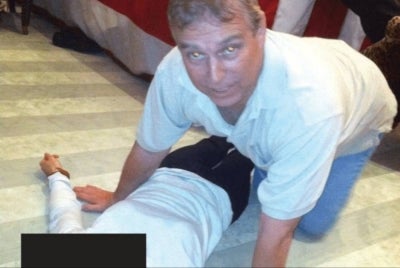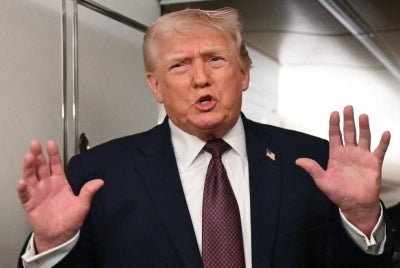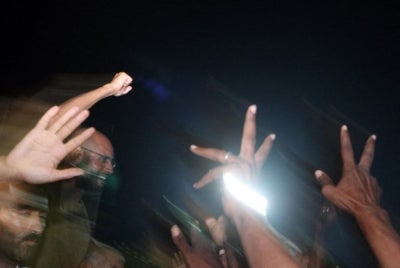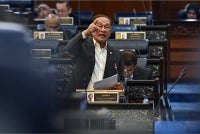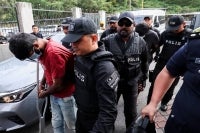Lula's remarks propel Brazil's position against Gaza genocide
Lula compared Israel's genocide in Gaza to the Holocaust, and observers have opined that his stance may resonate among global South nations and encourage other countries to take a stance on the current mass murder in the Middle East.
SHARIFAH SHAHIRAH
SHAH ALAM – A recent speech by Brazil President Luiz Inácio Lula da Silva has placed Brazil at the forefront of a movement that opposes massacres in Gaza.
Lula compared Israel's genocide in Gaza to the Holocaust, and observers have opined that his stance may resonate among global South nations and encourage other countries to take a stance on the current mass murder in the Middle East.
"What is happening in the Gaza Strip with the Palestinian people has no parallel in other historical moments. In fact, it did exist when Hitler decided to kill the Jews,” Lula said during his speech at the 37th African Union Summit, that took place in Addis Ababa, Ethiopia.
Comparing Israel's mass killing of Palestinians in Gaza to the Holocaust drew an immediate reaction from Israel's Prime Minister Benjamin Netanyahu.
“President Silva has disgraced the memory of six million Jews murdered by the Nazis and demonised a Jewish State like the most virulent anti-Semite. He should be ashamed of himself,” Netanyahu said.
Netanyahu's rebuke came shortly after Lula's speech on Feb 19.
He also labelled Lula's comments as antisemitic and called for him to retract his statements.
Netanyahu then summoned Brazil’s ambassador to Israel for a “stern reprimand,” asserting that Lula had crossed a “redline.”
In response, the Brazilian government ordered its ambassador to Israel to return to Brazil.
Previously, Lula also introduced the term ‘genocide’ for the first time to describe Israeli attacks on Gaza, adopting a more critical stance towards Israel's disproportionate response to Hamas operations.
“It isn’t a war, it’s a genocide that has already killed almost 2,000 children that have nothing to do with the war.
"They are victims of war. Honestly, as a human being, I don’t know how someone is capable of waging a war knowing the result is the death of innocent kids,” he stated on Oct 25 last year.
On the same day, Lula engaged in a phone conversation with the Emir of Qatar, contributing to diplomatic efforts aimed at repatriating Brazilians amidst the deadlock between authorities regarding the opening of the border with Egypt.
When asked for a position on the Hamas operations against Israel on Oct 7, resulting in approximately 1,400 dead, Brazil’s Ministry of Foreign Affairs released a statement on Oct 12 outlining the Lula government's rationale for refraining from labeling Hamas as a "terrorist group."
“Regarding the classification of terrorist entities, Brazil applies the UN Security Council determinations since it is responsible for guaranteeing peace and international security in the terms of Article 24 of the UN Charter," said the official statement.
Before the official statement, a requisition endorsed by 61 Bolsonaro-aligned federal deputies, representing parties such as the Liberal Party (Bolsonaro’s party), Podemos, MDB Party, PSD, and Republicanos Party, urged the Lula government, through Itamaraty, to designate Hamas as a "terrorist organisation."
In the week after the ministry’s declaration, on Oct 20, the Brazilian president, for the first time, characterised Hamas's actions as "terrorist" and criticised Israel's response as "insane."
During a speech at the Bolsa Família’s 20th-anniversary celebration ceremony, Lula drew attention to the number of children killed in the conflict due to Israeli attacks.
“Today, when [Family Grant] the programme celebrates 20 years of existence, I cannot but remember 1,500 children that have already died in the Gaza Strip.
“They didn’t ask Hamas to act madly as they did attacking Israel, but also didn’t ask Israel to react insanely and kill them.
“Exactly those who have nothing to do with the war, who just want to live and play, who haven't had the right to be children," he said.
A lawyer, involved in a lawsuit against US President Joe Biden who wants to “end with the Gaza Strip”, argued that the US must cease its support for Israel's genocidal campaign.
In the meantime, the Brazilian president engaged in discussions with leaders from various countries, including Israel, the Palestinian Authority, Egypt, Iran, Turkey, France, Russia, and the United Arab Emirates, aiming to facilitate a resolution to the genocide.
On Oct 27, Lula also heightened his critique by stating that the Israeli Prime Minister's objective was to "end with the Gaza Strip."
“Now, what we are seeing is the insanity of Israel’s prime minister wanting to end with the Gaza Strip, forgetting there are more than Hamas soldiers there.
“There are women and children, the biggest victims of this war,” he said.
During the event, the Brazilian president stressed that his government does not regard Hamas as a terrorist organisation, despite employing this term to describe the operation on Oct 7.
"I didn't want the Brazilian press to have any doubts about Brazil's behaviour. It only recognises as a terrorist organisation what the UN Security Council recognises.
“And Hamas is not recognised by the UN Security Council as a terrorist organisation, because it contested elections in the Gaza Strip and won. What did we say? Hamas' act was terrorist," Lula added.
Various expert opinions on the current political and diplomatic tensions between Brazil and Israel suggested that Brazil's position might resonate with nations in the global South, potentially inspiring other countries to adopt stances on the ongoing Middle East conflict.
According to online News Portal, BrasildeFato, Portuguese University of São Paulo, Centre for Arab Studies, director and historian Arlene Clemesha highlighted the potential for Lula to lead a movement in collaboration with South Africa and other nations that have cut diplomatic ties with Israel.
"This could be seen as a sign that Israel is losing support for its crime against humanity," he said.
Arlene also stressed that this reaction is a defensive tactic employed by Israel to shield itself from attacks.
“Netanyahu’s reaction was expected. Israel’s approach regarding foreign affairs has been to accuse any criticism of being antisemitic.
“These comparisons with the Holocaust are one of the points most often used to attack opponents.
“What the State of Israel is doing with the memory of the Holocaust is using it to benefit its current policies," she said.
She highlighted that while the president oversees the state bureaucracy, there exists a dynamic where, at times, one entity constrains the other.
“And what we've seen since October 7 is President Lula somehow pulling the state bureaucracy to the left, so to speak, towards international solidarity with the Palestinians.
“Because we've seen Lula's moves since the first few weeks, when he said, for instance, that this was genocide,” Arlene added.
Another expert, Portuguese University of São Paulo, Pontifical Catholic Foreign Affairs professor Reginaldo Nasser declared that President Lula's statement during the 37th African Union Summit marked a political stance, specifically when he characterised the events in Gaza as a genocide.
“For a long time now, accusations against Israel have been accumulating, and this is becoming normal. Lula raised his tone to call people’s attention, and [he] is in a very favourable context.
"There’s no explanation for Israel to be killing women and children," Lula said in Egypt
Reginaldo Nasser further highlighted that long-standing accusations against Israel have been accumulating, and Lula's heightened tone serves to draw attention to the issue in a particularly favorable context.
He also noted that Colombia, Chile, and Bolivia had already taken a strong stance against Israel by the end of 2023, indicating that Lula's opinion aligns with the prevailing sentiment in the region.
“Lula’s statement will be important in Latin America. It’s still at the beginning, but there is this leadership [Brazil] regarding Gaza.”
Nasser suggested that Lula's statement was strategic, deliberately drawing attention to the Gaza massacre and anticipating a strong Israeli reaction, especially concerning references to the Holocaust.
Mohammed Nadir also holds the view that the Lula government's position could position Brazil as a leader, given the disorganisation of the international criminal justice system caused by Israel's non-compliance with international law.
“We cannot forget that Brazil is an important country aspiring to become a global power and has all the conditions to play this role.
“It is a country that advocates for multilateralism, proposing a project to change this post-World War II international system dominated by the United States and its European followers.
“So, there is a larger context of regional powers contesting this situation of disorganisation of the international system," he said.
Pontifical Catholic Foreign Affairs professor Bruno Huberman labelled Lula's statement as spontaneous and improvised.
He added that it was not a decision made collaboratively between the Ministry of Foreign Affairs and the Presidency of the Republic.
Download Sinar Daily application.Click Here!

